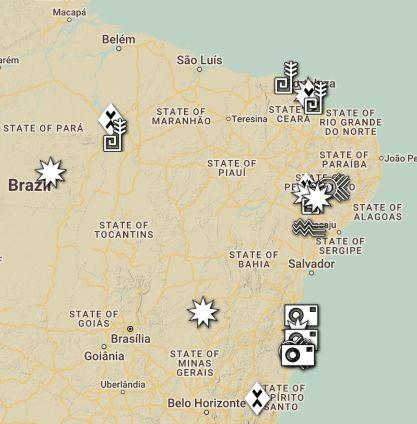Atmospheres of Violence

‘Sustainable’ Development and Atmospheres of Violence: Experiences of Environmental Defenders
Principal Investigator: Dr Mary Menton, University of Sussex
Funded by The British Academy, this project aims to explore how environmental defenders experience violence in relation to projects designed to promote the UN Sustainable Development Goals, and why they continue to fight despite the risks.
In 2014 the UN’s Special Rapporteur on the Situation of Human Rights defenders identified environmental defenders as those most at risk of violence and death. Global Witness reported that almost four environmental defenders were killed per week in 2017. This project focuses on defenders working around natural resource extraction and agricultural developments in Africa (DRC, Guinea-Bissau), Asia (Bangladesh, Cambodia) and Latin America (Brazil, Ecuador). It aims to identify the governance structures and socio-economic, political and historical conditions and processes that are at the root of atmospheres of violence around ’sustainable’ development projects.
The project responds to an area of urgent policy and humanitarian concern by examining how and why environmental defenders experience violence in relation to sustainable development. By identifying the factors and processes producing violence, the project seeks to enable policymakers to better assess when and how projects designed to promote sustainable development might place environmental defenders at risk of eroded dignity, physical harm and even death.
Another Sky
Another Sky arises from the international research projects ‘Sustainable’ Development and Atmospheres of Violence: Experiences of Environmental Defenders
and Mapping Indigenous Rights Abuses in Northeast Brazil, and an emergency research plan to investigate the impacts of Covid-19 among the Indigenous peoples. In an interdisciplinary movement and in a network, we use three research methodologies from political ecology, and the environmental humanities: reports of the experiences of the defenders, cartographies of conflicts realised by Indigenous researchers and students, and works by Indigenous artists about the effects of the Covid-19 pandemic, associated to the ecological conflicts experienced by the communities. The result is presented on the website Another Sky, in a mapping and virtual exhibit.
From these territories of art and war emerge different forms of resistance, narratives, constructions and reconstructions of worlds torn by conquest, colonialism and capitalism.
We combine the complexity of contemporary Indigenous struggles: art and war. The mapping was conducted by Indigenous and non-Indigenous researchers associated to the project, particularly students from three universities in Bahia: the Federal University at Bahia (UFBA), the Federal University at Recôncavo da Bahia (UFRB) and the State University of Bahia (Uneb). This is not a complete mapping, but a continuing process under construction. The idea is that the survey, in a partnership with this network of universities with the Indigenous movements, will continue, by including new and revised descriptions of conflicts; and simultaneously improving the descriptions already realised. It is also hoped that the project will develop by making visible not only the Indigenous resistance, as in the current work, but particularly those that perpetuate the violence and invasions of territories and Indigenous lives.
In conjunction with the mapping of the ecological conflicts, artworks were created by 15 Indigenous artists, as well as a documentary directed by two Indigenous filmmakers, Graciela Guarani and Alexandre Pankararu. The art that illuminates this constellation was created by the artist and designer Denilson Baniwa.
For another horizon of conviviality of differences, new worlds, that are more just and egalitarian, and another Sky suspended on high.
Project coordinators: Mary Menton (SSRP/University of Sussex), Felipe Milanez (IHAC/UFBA), Jurema Machado (CAHL/UFRB) and Felipe Cruz Tuxá (Opará/Uneb)
Artists:
Arissana Pataxó (Bahia), Eduarda Yacunã Tuxá (Bahia), Glicéria Tupinambá (Bahia), Olinda Yawar Tupinambá (Bahia), Edivan Fulni-ô (Pernambuco), Leide Pankararu (Pernambuco), Lindaura Xukuru-Kariri (Pernambuco/Alagoas), Ziel Karapotó (Alagoas), Benício Pitaguari (Ceará), Reginaldo Kanindé (Ceará), Arawi Suruí (Pará), Irekran Kayapó (Pará), Kryt Gavião Akrãtikatejê (Pará), Isael Maxakali (Minas Gerais).